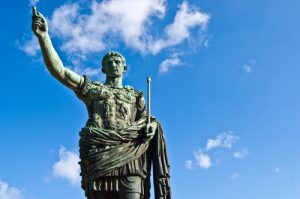By Bridgit McCarthy
Bridgit McCarthy teaches third grade at New Dimensions, a public charter school in Morganton, North Carolina.
Today in social studies, we assassinated Julius Caesar!
My students’ faces registered shock, sadness, and a sprinkling of outrage, all nicely mixed with understanding.
How mean! Why would anyone kill their ally? I bet his wife feels sad.
JC helped get France for them—except it was, you know, Gaul back then. Plus, his rules helped the plebeians get more stuff from the laws.
These comments show comprehension and recall—a good start. Here’s one of the most telling comments from our class discussion; notice how it combines historical knowledge and understanding with a bit of empathy.
Well, it did kinda seem like he wanted to be a king—and the Romans said no way to kings waaaay back—like in last week’s … lesson.
These quotes demonstrate comprehension of rigorous content and use of sophisticated vocabulary. They came from third graders.
Yes, the words “stuff” to describe political change, and “sad” to describe a distraught wife may smack of 8 and 9 year olds and, but “plebeians” and “ally”? I would have expected such vocabulary from the middle school students I used to teach. This is my first year teaching third grade; I’ve been delighted to see how eager younger students are to dig into history and science content.

Caesar courtesy of Shutterstock.
The assassination and subsequent discussion came about two-thirds of the way through our Core Knowledge Language Arts unit on ancient Rome. That unit takes about three weeks, starting with the basic question “What Is Rome?” and then introducing students to legends and mythology, daily life in Rome, and major wars and leaders. It ends with Rome’s lasting contributions.
I am thrilled with what students are saying and writing as we progress. While I always have high expectations in my classroom, I was a bit nervous when we started the ancient Rome unit. The objectives are complex, the vocabulary is challenging. The content itself includes a great deal of geography and culture, plenty of politics, and an assumption that Core Knowledge kids already knew quite a bit about ancient Greece.
The opportunity to check and refresh some of that knowledge of Greece was an early order of business. In CKLA, second graders spend several weeks on ancient Greece with two back-to-back units: The Ancient Greek Civilization and Greek Myths. In the third-grade unit on Rome, a review of the Greek gods and goddesses was the introduction to a lesson on their Roman counterparts. Seventeen of my twenty students attended second grade at New Dimensions, and sixteen attended first (which has a unit on Early World Civilizations), so I was curious to see how much they would remember.
In theory, recall of these facts of Greece ought to come fairly easily. According to one student, they spent “forever” on ancient Greece—and they loved it. In our school, teachers combined the CKLA materials and additional teacher-created materials to really immerse students.
As a result, my third graders had no problems here. Building on their existing knowledge of other cultures’ gods and goddesses made the new material easier to access. I also didn’t have to “teach” polytheism because the very idea that people had separate deities for different aspects of their lives was old hat to them, having explored it in first grade with Mesopotamia and Egypt and again in second with ancient Greece. The three students who didn’t attend New Dimensions in second grade did need a little more support. I helped them do some additional reading and partnered each one with a student who has been at New Dimensions since kindergarten. Because the unit lasted a few weeks, these new students had time to catch up by learning about Greece and Rome together.
For teachers in schools without a really rich, cumulative curriculum in which the topics build off of each other, it can be hard to understand just how much children can learn in the early grades. For example, I have a good friend who teaches third grade in another school—one that does not use Core Knowledge. In a recent conversation, she shared her “word a day” way to tackle tiered vocabulary words and complained about highly scripted practice-test items that she must teach to prepare for the end-of-grade tests. I shared that my Rome unit is going well, but she worried for me: Are we covering the state standards? She meant this as a genuine professional concern, and she wondered what my students’ real “take-away” would be from our unit on Rome. I shared a little anecdote from my class, showing that my students are developing sophisticated language and useful knowledge: A student was playing a dune-buggy race car computer game in my room during indoor recess. I scoffed at its total lack of educational value. He pouted at me a bit and said, “Dang, that’s what my mom said last night! Et tu, Mrs. McCarthy?”